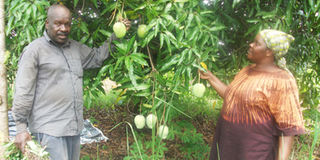Prime
Gulu politician reaping from his devotion to tree and fruit farming

Uhuru and wife in the tree farm, Uhuru in the mango farm. Santos earns about 2.5m a year in tree planting. He used proceeds from this to diversify into fruit planting, animal rearing, poultry farming and hopes to venture into more areas. PHOTO BY JACKY ADURE.
What you need to know:
Gulu LC3 chairman narrates his success story of tree and fruit farming to Jacky Adure
As you approach his home in Rom village in Gulu district, a long well lined up forest of pine trees grace the entrance to his home sending a signal of the resident’s love for trees and forestry. Santo Uhuru, now a stable diversification farmer, started planting trees for sale at Shs50 in 1977.
At a tender age in primary 7, Uhuru, now Koro Sub-county Chairman started planting trees to save his mother and sisters the long distance search for firewood. Little did he know that this would earn him a stable income to serve him and his family for years.
“After the trees had multiplied and firewood was abundant at home, I decided to sell some to earn an income that would support my basic needs at school. Shs50 may sound like little money but by then it was of good value and I used to get a reasonable profit as three tree seedlings then cost Shs100,” he said.
It’s estimated that a pole in Gulu now costs between Shs3,500 and Shs5,000 depending on its size, an amount Uhuru says he is assured of getting because of his regular supply. After attending different workshops on farming, he has greatly picked even more interest due to its benefits. “Farming has changed my life because from tree selling alone, I’m able to get Shs2.5m per year,” he said.
With the money acquired from tree planting, Uhuru has been able to diversify his farming to fruit farming, animal rearing, and poultry keeping that is steadily increasing his source of income.
A glance at his compound will not only reveal pine, eucalyptus, umbrella and neem trees but also an orchard of mango trees of different types, avocados, pineapple plantations, apples, banana stems, oranges, pawpaw, lemons, jack fruits, coconuts and passion fruits. A tour of his farm reveals that the land is over 30 acres and farming takes over three quarters of its major activities with settlement consuming only a quarter of it.
“I’ve not earned much yet from fruit trees because it’s an activity I have adopted recently and my trees have not given me much yield yet,” he said.
With the mango season on in the north, the chairman has hopes that his sale will double as he plans to sell both at the local market and to other districts to earn a reasonable income. “I believe at the end of the season I will get about Shs500,000 from the sale of mangoes only,” he says.
Uhuru said the advantage of fruit farming is that the fruits never dry out with close monitoring and maintenance.“Different fruits have different seasons and I know after mangoes another fruit will be ready for sale and you know what that means, non-stop flow of cash,” said the excited LC3 Chairman.
His farming has not just stopped at the borders of his home but has also extended to his Sub-county where he has distributed tree seedlings to every LC1 chairman to promote tree growing. “We can make pension out of trees and gifting this sub-county with trees is a good pension for the community here,” he affirmed.
However, in his day to day activities in the farm, Uhuru says insecurity, pest and disease attacks and environmental change are his daily challenges. He noted that he does alot of mulching during the dry season to conserve the soil moisture content. “Dry seasons come with a lot of hazards and most of my crops dry up because I have no irrigation system. I’m still planning for it.”
He said it has been difficult to fight pests and diseases because despite his efforts to spray, they still attack the fruits.
To save on expenditure, his children help him to farm and maintain the trees. “My children are my major source of manpower and this has greatly helped me as I spend less money paying labourers on my farm,” he adds.
Despite his challenges,Uhuru sees himself and the family earning a lot of money from their farm in five years’ time.
“In the next five years, I will have diversified my farming more as I plan to open up a fish farm and plant more crops that will support my family after I retire,” saidUhuru who plans to retire from politics in 2016.




